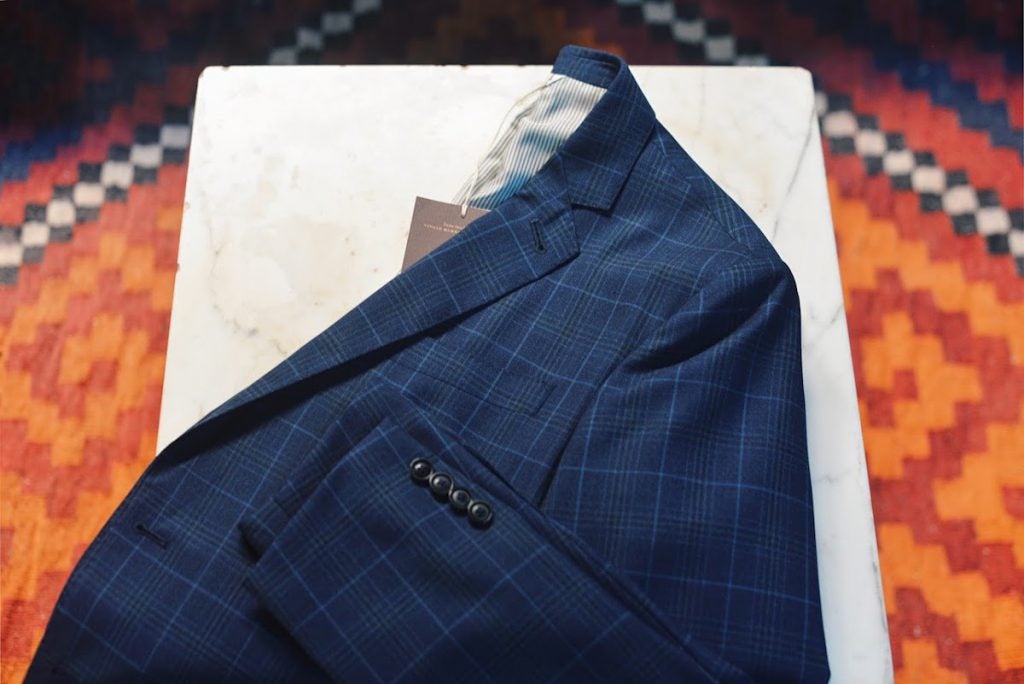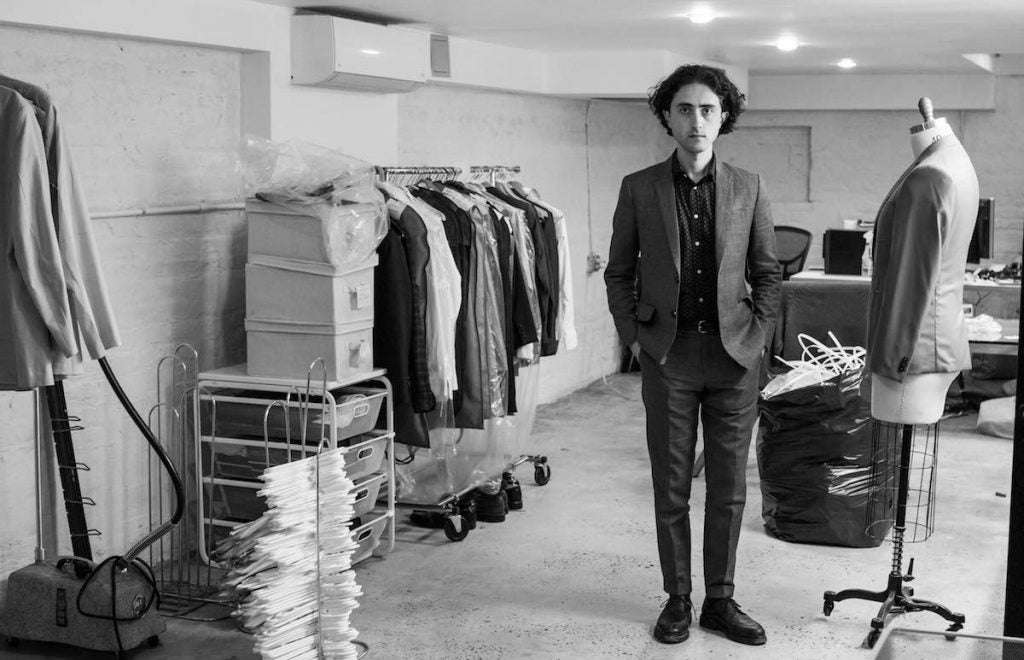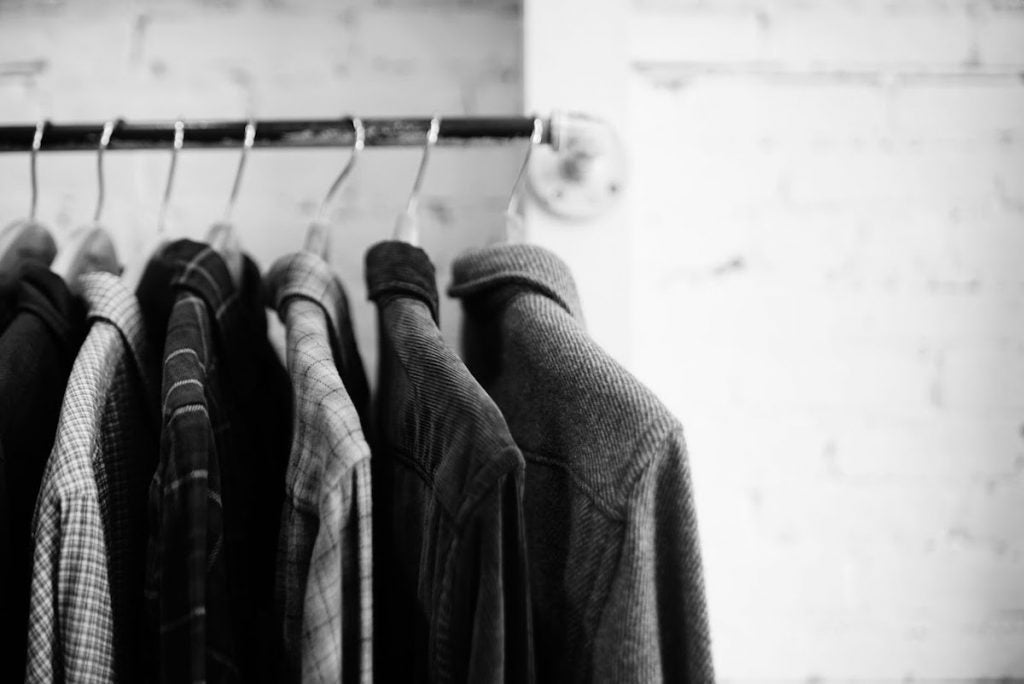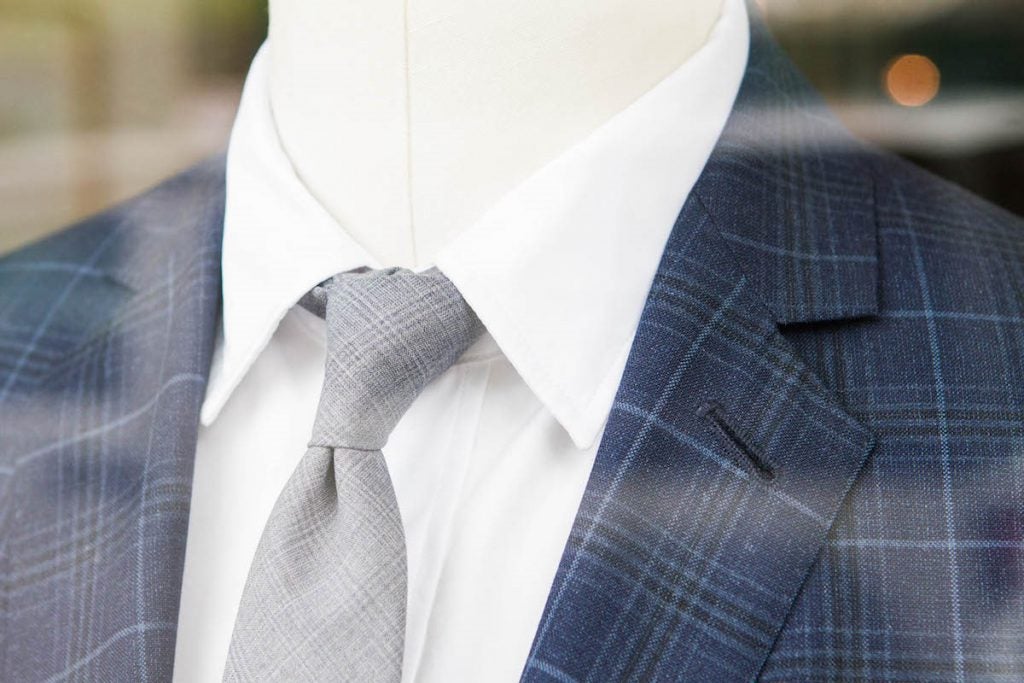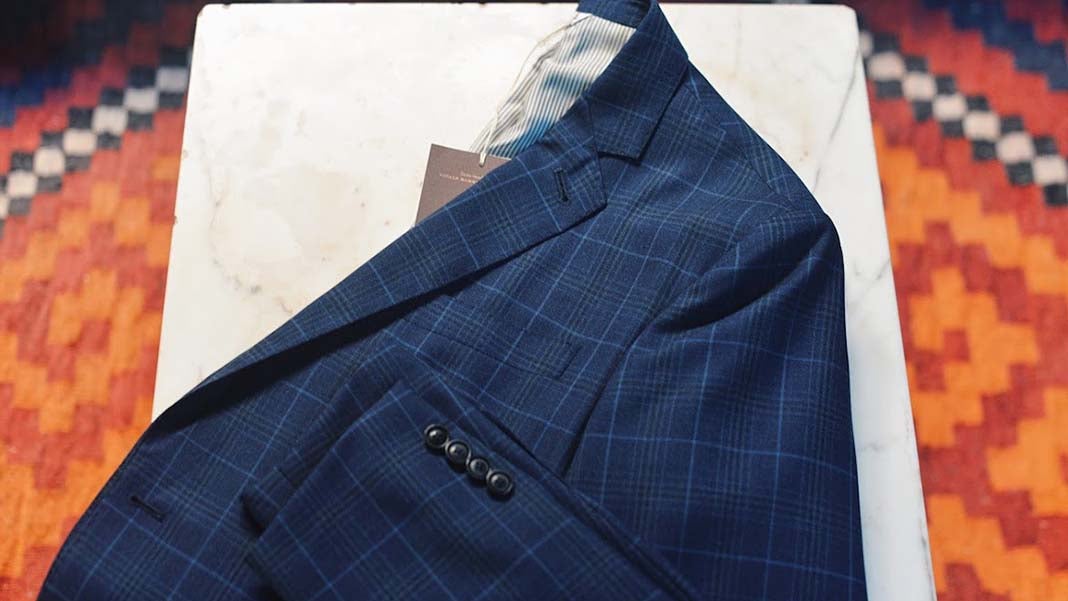
It all started with the realization that he couldn’t find a proper suit at an affordable price—so Daniel Lewis, being the creative type, set out to make his own. This simple decision, made almost a decade ago, has since snowballed into a small business specializing in bespoke menswear. Daniel and Brenna Lewis, both of whom studied at the University of California (he studied fine art and she studied sociology), have built a well-known but intimate company that provides tailor-made suits and other menswear at an affordable price point.
The growth of Brooklyn Tailors has been manageable and organic but significant. After making himself a couple of suits, Daniel started selling them online, and it was then that he and Brenna realized that there was a gap in the market for what he was making. They provided one-on-one fittings for their clientele first out of their apartment, then in a small retail space. They’re currently in the process of opening a new (and much larger) retail space in Williamsburg, Brooklyn.
Brooklyn Tailors grew into a full-fledged small business, serving not only New Yorkers aplenty but also the Japanese market (the crown jewel of the global fashion market). However, Daniel and Brenna have always worked at a slower, more reflective pace. Always working within their means, the duo understands that quick growth isn’t the only way to run a business, and in fact, when your bread and butter is custom-made clothing, this approach might actually be integral to your bottom line.
Below, we talk to the founders of Brooklyn Tailors about the process of smart bootstrapping, the differences between the American and Japanese fashion markets, and the importance of developing strong relationships with manufacturing partners and customers alike.
BOND STREET: How did you get into fashion in the first place?
BROOKLYN TAILORS: Daniel Lewis: This wasn’t always our trajectory early on; we didn’t always think we’d do this. It really started with my interest in clothing, and around the time that we finished school, I got to a point in my life where I wanted to have a suit in my closet that I really liked. I wanted one that fit well and looked good, and I went out looking for it, but I never found it. I started to get really frustrated, and that was the initial spark—I had this thing that I wanted but couldn’t find. Coming from a creative background, my tendency is to make something that I can’t find, so I did that. At first it was a hobby, but then I realized that maybe it was something I could do. When we moved to New York, I started working in the industry at the bottom rung and started learning the business.
BOND STREET: Tell me the origin story of starting out of your apartment in 2007.
BROOKLYN TAILORS: Brenna Lewis: We were living in a very small 600-square foot studio in Clinton Hill. It started with Danny’s vision—he wanted to make the suits that he was looking for. This meant sitting at the dining room table with my old sewing machine and a book that he bought at Barnes & Noble. He realized that maybe the best use of his time wasn’t hand-making all of these suits, and that if there was a hole in the market and he could find a manufacturer that could make his design, then maybe that was the inroad to the business. So—this was around 2004 or ‘05—he got on the Internet and started researching manufacturers who could make small runs of suits. It turned into a game of telephone and he got bounced around to a bunch of different places.
BOND STREET: It must’ve been difficult to find such a manufacturer.
BROOKLYN TAILORS: BL: When it comes to making yourself a single suit, there aren’t a lot of options out there, so he had to make small runs of suits. Then he realized, “Well, I have to sell these I guess. I don’t need 12 suits.” From there it went to eBay, and he came upon this strange following who were like, “Where did you find these? And how can I get more?” From there, slowly, it turned into a fully-fledged business. We went onto Etsy after that and then opened our first store, just over 5 years ago. That was kind of out of necessity, because we were doing custom fittings and holding all of this merchandise in our tiny apartment. Neither of us had any idea that Danny making himself a suit that fit would turn into what it is today.
BOND STREET: You moved into your first storefront in 2011 in Williamsburg. What was that process like?
BROOKLYN TAILORS: BL: It was a very strange process. It’s a super small store—about 300 square feet. When we first opened it, we didn’t have an off-the-rack line to sell, it was more to get the custom fittings done outside of our apartment. We thought, if we could just take a few appointments here every week, then it’ll pay for itself. We’re in the middle of opening a new store right now thankfully that is literally 10 times the size. The old space served us well though. We both had day jobs at the time, so we’d get out of work and go to Home Depot and carry our paint and wood and work till 10 at night. It was overwhelming, and we’re in the middle of the exact same thing right now.
BOND STREET: How did you raise the capital for that move? How did you bootstrap the business generally?
BROOKLYN TAILORS: BL: It was from the money we made selling suits online. I’d say one of the most interesting things about our company is that we have always been completely self-funded. We each put in about a thousand dollars when we started, and we have never contributed more money to it, and have never taken money from an investor. It’s a very different way of running a business. We’ve always had to be very careful about the decisions we’ve made. We could have moved into a much larger store 5 years ago, but we didn’t. We made very safe decisions, but that’s allowed us to grow slowly and organically. We’ve never had to lay anyone off because of financial issues, and have never gone beyond our means.
BOND STREET: Tell me about the manufacturing process for the clothes. What does the supply chain look like?
BROOKLYN TAILORS: DL: That’s one of the hardest things about starting a small business: finding good manufacturing partners. We work with a few different small manufacturers, all of which specialize in one thing that they do best. Our very first partner, who we still work with today, is a small tailoring workshop in Kathmandu, Nepal. I found them early when I was still tinkering with the sewing machine on the dining room table. It’s been a great relationship—they still make all of our custom suits. Like us, they’re a small business. They make each suit one at a time by hand, and as we’ve grown, they’ve grown with us. As our ready-to-wear collection has grown, we’ve done more and more manufacturing in Portugal. We now make all our shirts and ready-to-wear suits there. There’s a long, rich history of quality craftsmanship engrained in the culture there, much like what you’d find in Italy. We make our ties in the U.S.
BOND STREET: An accessible price point is a core part of the business, right?
BROOKLYN TAILORS: DL: That was central to our concept and business plan. We wanted to offer a certain level of service and quality that we didn’t feel was available at a certain price. That came out of being around people our age, people in their twenties, and those who come from more creative backgrounds. A lot of people that cared about how they dressed and who had really great taste didn’t have the income to go to a lot of the other custom suit makers. That’s part of what led us to working with our partner in Nepal, who could do it at a high quality and reasonable price.
BOND STREET: You sell to retailers such as Barneys. Who else carries your clothing, and how does this aspect fit into your overall business?
BROOKLYN TAILORS: DL: Barneys is by far the biggest retailer we work with in the States. We sell to a handful of boutiques around the country, but our wholesale distribution is small, and that’s intentionally so. Our main focus continues to be custom clothing and working with customers out of our retail store. But we really love working with our retail partners. Barneys has been a really interesting partnership because what you’d expect from them is big name fashion designers, so it’s been great to see them take us under their wing. When they picked us up we were a very small company, and they’ve really grown the business with us.
BOND STREET: What about your international sales?
BROOKLYN TAILORS: DL: We do a lot of business in Japan as well, and we just launched an autonomous, separate collection for the market a little less than a year ago. It’s called BKT by Brooklyn Tailors. That was a result of getting a lot of interest from Japan. We were selling our main collection directly to Japan and it grew to a point where we were able to sit down with a Japanese partner to help manage what we saw as a very important business, one that we had difficulty managing on our own, since we could not physically be there and didn’t know the market that well.
BOND STREET: What’s the biggest difference between Japan and U.S. market?
BROOKLYN TAILORS: DL: For anyone who works in the fashion industry, I feel like Japan is a constant topic. It’s a huge market, and the Japanese are some of the most fashionable people on the planet. They’re huge consumers. Last time we went to Japan, we walked around and everybody was shopping: there’s more menswear stores in Tokyo than in all the United States combined. And they’re all cool, and everyone’s got shopping bags in their hand. It’s a really interesting dynamic. I’m very influenced by Japanese design and culture, and the Japanese are very interested in American culture and design, so there’s this interesting feedback loop between the two countries.
BOND STREET: How does the design of your Japanese collection differ?
BROOKLYN TAILORS: DL: It feels like our DNA, but it’s geared a little more toward a fashion market in that it has a little bit more going on. It’s less basic and minimal—it’s a bolder interpretation of our style. That’s really a result I think of the fact that the typical Japanese man is willing to go there. You walk down the street and you see a lot of very fashionably daring men. I think the U.S. consumer is no less fashionable, but has a more understated, sober way of dressing.
BOND STREET: What’s your most effective marketing channel?
BROOKLYN TAILORS: DL: Word of mouth is our most important asset. We’ve never spent a penny on advertising or PR. Our philosophy is that, if every single customer who walks out the door happy, then your business will grow. I think that’s true in any business, but it’s especially true when you offer something custom made, because when a guy puts on his custom suit and he goes to work or a wedding or out for an evening, it’s not the kind of thing that flies under the radar. If it turned out the way it should have, people are gonna ask him about it, and he’s proud to tell people about it. That’s part of the experience. Custom clothing is about building relationships. We get to know our customers, and they like to tell their friends. Press is also very important. We’ve never sought it out or had a PR firm, but we’ve been very lucky to have a lot of people in the media world who have reported on our brand in really good ways, and that’s been very helpful.
BOND STREET: Looking back on the early days, is there anything that you would do differently?
BROOKLYN TAILORS: DL: The short answer is, there’s a million things we’d do differently. As we said, neither of us had a background in this. I had worked in this industry but only for a short number of years before we went out on our own. Every day has been a learning experience, and that hasn’t ceased. Every day we wake up and there’s a new challenge or problem that presents itself. You just have to tackle it and figure it out. Being a small business owner is all about being incredibly adaptable and not only focusing on what you feel like your job description is or what your business card says, but being able to look at the big picture and solve problems.
BOND STREET: What’s the biggest business challenge you face today?
BROOKLYN TAILORS: DL: Right now, our lives are all about this new storefront. The day-to-day doesn’t slow down when you’re doing an extraneous project like this, but this new store is a huge undertaking that’s been two years in the making.
BL: There’s also a giant question mark on the business side, because we don’t know what that’s going to mean for our company. We have been working out of this 300-square foot storefront, and we have a little office space where we doing custom fittings as well, but now we’re gonna be under one roof, and selling other brands for the first time. We don’t know what that’s going to mean for us financially, or how many more people are going to be walking through the door (we hope a lot!). You can never tell ahead of time—which can be exciting, but for the first season, we don’t know what people are going to be drawn to, what sizes we should be buying or what patterns are going to emerge. It’s a lot of trial and error when you haven’t done something like this before. It’s an exciting time but it’s a little bit scary to throw yourself out there in a way you’re not used to.
BOND STREET: What’s the strategic advantage of operating in New York? What’s a drawback?
BROOKLYN TAILORS: BL: The drawback is that it’s really fucking expensive. It would be easier to run a business in just about any other place. But, the advantage is that, in the United States, this is probably the one place where—especially for the types of suits and dress shirts that we’re making—people are actually in the market for them. We grew up in San Diego, a place where nobody wears a suit. When we got married, we had to make our dads suits to wear to the wedding! We couldn’t run the company in San Diego, or lots of places in California for that matter, or many other places. It just wouldn’t make sense. New York is where the trade shows are, and there’s a lot of shopping in the area that we’re in. We get a lot of foot traffic that you wouldn’t get in a small town. It would be lovely to run this business upstate, but you can’t do it on the same scale. The fabric manufacturers come to New York once a year, so we don’t have to go to Italy to look for good fabrics. There’s a lot of conveniences because there’s an industry here.
BOND STREET: What’s the best part of running your own business?
BROOKLYN TAILORS: DL: Running this business has been, by far, the hardest thing we’ve ever done—it’s full of blood, sweat, and tears; there’s some really hard moments doing it. But the sum total or conclusion is that we would never trade it for anything in the world. The amount of deep satisfaction and accomplishment that you get at the end of the day and the end of the year when you look at all the hard work you’ve put into something that you’ve created is incomparable. It’s yours, and that’s a really unique feeling.
BOND STREET: What’s your 5-year vision for Brooklyn Tailors?
BROOKLYN TAILORS: DL: I can’t say we have one written down—much like the inception of the business it’s been a very organic process. We never wrote a business plan. But we have ideas about how we want to grow, but as we said earlier, we grow slowly and that continues to be our strategy. There’s a point at which you can say you’re comfortable with where you’re at.
BOND STREET: That defies a lot of the perceived wisdom.
BROOKLYN TAILORS: DL: I think that, in the business world, there’s almost this obsession with growth. There’s the saying, “If you’re not growing, you’re dying,” which on one level makes sense to me, but on another level seems completely insane. We sought to start a small business, and our business has already grown to a scale beyond what we expected. So I think our goal over the next few years is to solidify our business, to make it healthier and more efficient, rather than blowing it out to something that’s 20 times bigger than what it is. We touched upon the growing pains and the fact that every day is a new challenge… And you know, we’ve been around for about 9 years now, but that’s gone by so fast and things have been done at a very quick pace. I think there’s a lot of things that we can do now where we can step back and say, “Okay, let’s improve this, let’s fine tune this.” I think that’s what we’re all about now.
Quickfire:
BOND STREET: What’s one book every entrepreneur should read?
BROOKLYN TAILORS: Getting Things Done by David Allen.
BOND STREET: One brand that you admire:
BROOKLYN TAILORS: Tricker’s, an English shoemaker who’s been around for 100 years. They know what they’re doing and they haven’t diluted their offering.
BOND STREET: What are your favorite independent businesses in NYC?
BROOKLYN TAILORS:

